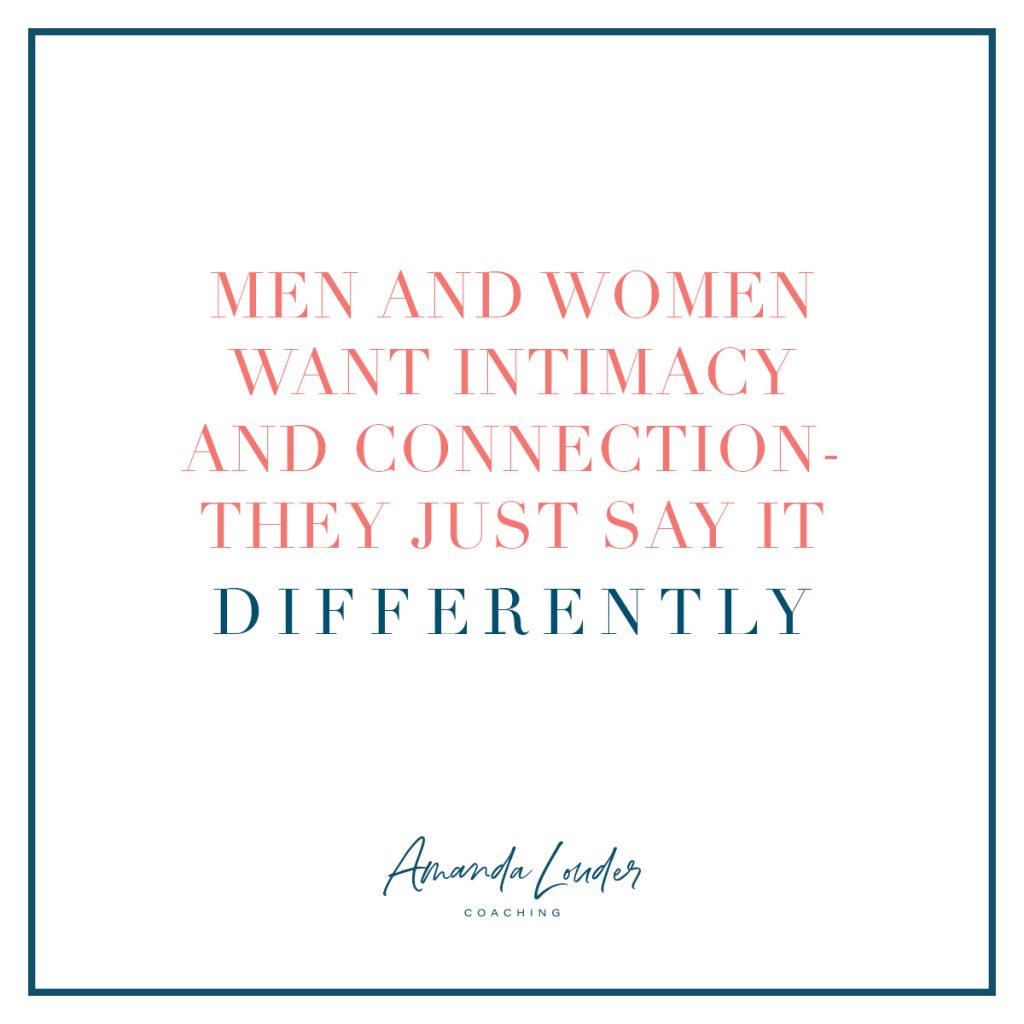
We know we don’t. . . we aren’t sure why. . . but we just don’t. So many of us do not feel comfortable talking about sex – even to our spouse. Our parents didn’t talk to us much about intimacy and so we aren’t sure how to talk to our children. Today on the podcast I will bring a few ideas to the table. I will share some tips to help you open up and talk more openly with your spouse. I have some thoughts on what works and what doesn’t – so let me help you out. We’ve got this.
Download your FREE Worksheet!





Show Notes:
Follow Amanda on Facebook and Instagram.
Join Amanda’s Private Facebook Group.
References for this episode:
Show Summary:
I don’t know about you, but I grew up in a home where sex just wasn’t talked about. I mean, yes, I did get the birds and bees talk when I was 6 years old and wondering how an unmarried relative was pregnant. My mom was also pregnant, so I’m sure I was just asking a lot of questions in general. But I really don’t remember any other specific conversations about sex until a few days before my first wedding. Much of what I learned about sex was from much more informed friends and TV and movies, none of which were reliable sources.
Because sex really wasn’t talked about, I didn’t know how to have conversations about sex with my spouse. Isn’t it funny that we can have sex…something so intimate and vulnerable, yet we often can’t talk about it with our spouse. We are more easily able to engage in the physical but when it comes to talking about it, we completely shut down. We don’t want to do it. And I know I’m not alone in this because many of my clients tell me the same thing.
True intimacy is about deeply knowing another person and being known by them. In all aspects. And it definitely takes a level of intimacy to bare all and be physically known by another person. But it takes another level to be intimate with someone on every level. To engage in the mental, emotional, and spiritual. It’s a very vulnerable place and often we are protecting ourselves from going to that place and/or protecting our partner. So I think we need to examine why we don’t open up.
Protecting Ourselves and our partner
Self-preservation is one of the most instinctual things that we do. Our lower brain was designed to keep us alive at all costs. And it does a fantastic job at that. So it is constantly scanning for what might cause us pain, because it knows that if we have pain, we might die. But it doesn’t know the difference physical pain, that actually might kill us, and emotional pain. It sees them as the same. Back in the caveman days, when our lower brain developed, physical pain and death was a real threat. Your brain also thinks that your survival depends on you staying in a tribe. Because if there is something wrong with you and you get kicked out of the tribe, you’re going to die. So it’s also wanting to protect you from that.
So, when we think about sharing a piece of ourselves, our brain kind of freaks out and says “you can’t do this, it’s dangerous! You might die.” And while the brain is just doing it’s job, not opening up to our spouse is really not serving us.
In our conversations, we also might want to protect our partner. We know that if we were to say certain things, that it would be really hard for our spouse and we want to protect their feelings.
Protecting us from what?
But protect us from what? What are those thoughts and feelings that our lower brain freaks out about? What is it that we are afraid of feeling? What are we afraid of our spouse feeling?
The number one thing we are afraid of is being rejected in some way. That our partner is going to think that we are strange or weird or that they don’t want to be with us. And then we are going to feel like we are not enough, which feels awful. We are afraid of feeling insecure. We are afraid of being alone.
How can we talk about sex?
So how can we talk about sex with our partner? How can we be vulnerable and open up and really communicate and build that intimate connection. Because truly that’s what we want, we want intimacy not just physical connection, yet we are really struggling to go there and to be that vulnerable and to open up.
We have to be willing to feel it all. We have to be willing to feel the fear. Feel the rejection. Feel the insecurity. Because truly, they are just feelings, and they won’t actually hurt you. But also understand that all of those emotions are optional. All of our emotions come from the way that we think. Even if our partner says words that we might feel rejected by, we don’t have to.
And here’s why we don’t have to feel negative emotion if we don’t want to. We think that a relationship is what our partner says and what they do and how they show up and if they’re behaving like we expect them to, but really a relationship is 100% about our own thoughts. We have our thoughts about them. We have thoughts about what we think they think about us. And then what we feel about our self in relation to them. And all of that plays in. And you can truly believe anything you want to. You can believe that your partner doesn’t love you or doesn’t understand you or is rejecting you or you can believe that that they love you and that they understand and they just don’t know how to show it or they’re just doing the best they can and it really means nothing about you. Because it really doesn’t. How they feel is based on the way that they are thinking. It really has nothing to do with you.
So when we have those hard conversations, we have to remember that our partner can think and feel however they want about what we said, and it’s really about them and nothing about us.
Saying the same thing in two different ways
Often, I find that when couples are trying to communicate about sex and it doesn’t seem to be working, that they are actually wanting the same thing In their marriages, they are just saying it differently and not hearing each other. They both want intimacy and connection. But as men and women and higher desire and lower desire partners we tend go about things differently.
Typically women want to feel connected emotionally before they engage in sexual behavior. They want to be cuddled they want to be romanced they want to know that their partner desires them other than just in the bedroom. They want their partner to be interested in them and what they’re doing.
Men also want to feel emotionally connected. They often just don’t understand that that is what they want. While women need to feel it before hand, men want to connect emotionally and physically through sex. That’s how they feel the closeness and the connection with their spouse.
So it needs to be some give-and-take. Men (or the higher desire partner) need to be willing to do the things before hand so that they can get what they want later on. Women (or the lower desire partner) need to be open and to ask for what they want beforehand and be willing to connect physically. It’s really a cycle. When both partners communicate and realize that they are both looking for connection, things are a lot better.
How to have a conversation
Recently, in a Facebook group I’m in, a man said that he was interested in anal play but was asking for suggestions of how to bring it up to his wife. My immediate response was “you ask her.” And if you aren’t comfortable asking her, you need to examine why. What is holding you back? What are you afraid of? And address those concerns first.
But when having a conversation I find that there are some steps to take that makes things as painless as possible.
- Plan out the conversation ahead of time. Maybe write down what you want to say and how you want to say it. Practice.
- Watch your language. Using “I” statements is very helpful in keeping things focused on what you want out of the conversation.
- Be direct – don’t beat around the bush. Say what you want and need. Honor your desires. So in the example I just gave he should say something to the effect of “I would like to talk to you about my desire for anal play.”
- Be specific – “I am interested in doing the following things….”
- Allow your spouse to ask questions. While you feel like you are being clear, you may not have anticipated everything they could be thinking and feeling.
- Be empathetic – try to understand where your spouse is coming from. What they might be thinking and feeling. If you were thinking those things, you might be feeling the same way. Allow them to think and feel however they want. This is all based on them, and not a reflection of you.
- Manage your emotions – remember that your spouse can’t make you feel anything. You get to control how you feel by your thoughts. Have some thoughts you want to redirect to handy, just in case the conversation doesn’t go the way you’d hoped.
If you want a copy of these 7 steps, you can go to this episode’s webpage and download them. AmandaLouder.com/podcast/117
I had a client that, after listening to my podcast and working with me and changed the way she felt about masturbation. In the past she had believed that it was sinful and that it shouldn’t ever be done by her or her spouse. When her spouse masturbated it made her feel insecure, that she wasn’t enough. But her views changed. She decided she wanted to believe that it was ok to masturbate within marriage as long as they had an agreement on how and when it could be done. She also wanted to try it for herself as a way to get to know her own body. She was terrified to bring it up to her spouse. Especially after how hard she had come down on him about it in the past.
We talked a lot about her thoughts and feelings going into it. We talked about what she needed to be thinking and feeling beforehand to have the conversation with him. She rehearsed the conversation with me ahead of time. We tried it a few different ways, anticipating how he might respond. The conversation actually went the best that it possibly could. It was a weight off of both of them. So many times we anticipate the worst, but we forget to anticipate the best.
After having the conversation, and many more that followed, the couple felt so much closer and definitely raised their level of intimacy with each other. Once they had overcome the initial hump, then it was a lot easier to have other conversations.
If you struggle to have conversations with your spouse, I’d love to chat with you about it and help you navigate those hard conversations and situations.
If you haven’t heard, my group coaching program is now open for immediate enrollment. You don’t even need to set up a free mini-session with me. You can sign up directly by going to AmandaLouder.com/groups.
But, if you still want a mini-session to see if group coaching is what you really want and if we are a good fit, you can sign up as usual on the homepage of my website. AmandaLouder.com. Wait times right now are about 2 months to get into a mini-session.



